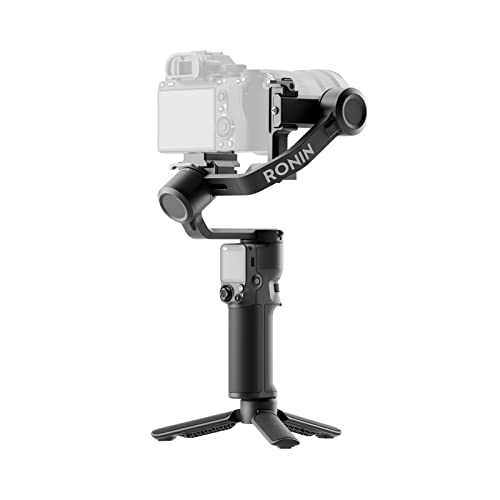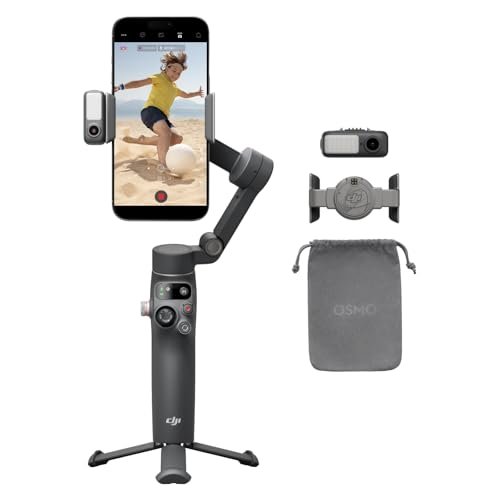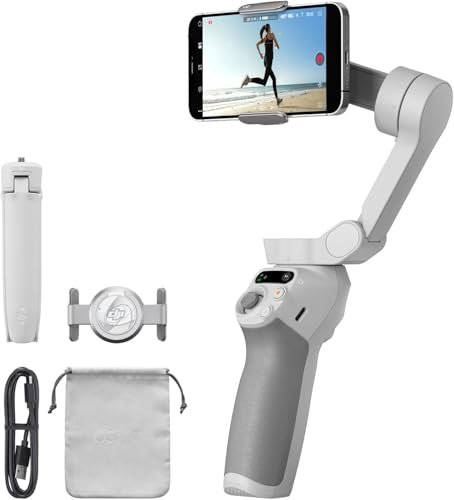So, you’ve got yourself a fantastic Canon mirrorless camera – perhaps an EOS R5, R6, or even the versatile R7 – and you’re ready to dive into the world of professional-looking video. But let’s be real, even with amazing in-body image stabilization (IBIS), handheld footage can still look a bit… well, shaky. That’s where a top-notch gimbal comes in! If you’re looking to elevate your videography with smooth, cinematic shots, finding the best Canon mirrorless for video and gimbal setup is paramount.
A good camera gimbal stabilizer isn’t just a fancy accessory; it’s a game-changer. It transforms your wobbly shots into buttery-smooth footage, making your videos look incredibly polished and professional. From dynamic tracking shots to subtle pans, a gimbal unlocks creative possibilities you simply can’t achieve handheld. We’ve scoured the market to bring you a list of the top 5 gimbals that pair beautifully with Canon mirrorless cameras, ensuring you get the most out of your video endeavors.
Let’s dive into the contenders that will help you achieve that perfectly stable shot with your Canon mirrorless camera!
DJI RS 3 Mini

The DJI RS 3 Mini is a true marvel for content creators on the go, making it an excellent companion for a lightweight Canon mirrorless setup. What truly makes it stand out is its incredibly compact and lightweight design – weighing less than a pound and a half, it’s designed for extended shooting sessions without arm fatigue, yet it still packs enough punch to stabilize a wide range of mirrorless cameras and lenses. This means you can travel light, shoot discreetly, and still achieve that signature DJI smooth footage.
Key Features:
– 795g (1.75lbs) Lightweight and Portable
– Wide-Ranging Compatibility with load capacity up to 2 kg (4.4 lbs)
– Bluetooth Shutter Control for seamless camera operation
– 3rd-Gen RS Stabilization Algorithm for pro-level stability
– Native Vertical Shooting for social media content
– 1.4″ Full-Color Touchscreen with intuitive UI
– Requires DJI Ronin app for activation and full functionality
Pros:
– Exceptionally lightweight and travel-friendly
– Surprising payload capacity for its size
– Quick and easy setup, including native vertical shooting
– Reliable DJI stabilization performance
– Intuitive touchscreen controls
Cons:
– Max payload might be limiting for larger Canon mirrorless bodies with heavy lenses
– Battery life is good but not as extensive as larger gimbals
– Relies on the DJI Ronin app for initial setup and updates
User Impressions: Users frequently praise the RS 3 Mini for its portability and impressive stabilization, especially for vloggers and solo creators. Many note how easy it is to throw in a bag and take anywhere, making it a favorite for spontaneous shoots. While its compact size is a huge plus, some users with heavier Canon RF lenses wished for a slightly higher payload.
DJI RS 4 Combo

The DJI RS 4 Combo takes DJI’s already impressive gimbal technology and refines it, offering a more robust and versatile solution for serious videographers using Canon mirrorless cameras. Its standout feature is the enhanced 2nd-Gen Native Vertical Shooting and the extended tilt axis, which provides more balancing space for larger camera setups. This combo pack also includes crucial accessories like the Focus Pro Motor, making it a comprehensive package for dynamic shooting.
Key Features:
– 2nd-Gen Native Vertical Shooting with a new horizontal plate for efficient switching
– Joystick Mode Switch for quick changes between PF, PTF, and FPV modes
– Teflon-Coated Axis Arms for smoother balancing
– 3kg (6.6lbs) Payload Capacity with extended tilt axis (8.5mm longer)
– RSA Communication Port for extensive control ecosystem
– New BG70 High-Capacity Battery Grip (sold separately, extends runtime to 29.5 hours)
– Combo includes Gimbal, BG21 Battery Grip, Quick-Release Plate, Extended Grip/Tripod, Briefcase Handle, and Focus Pro Motor
Pros:
– Excellent payload capacity for most Canon mirrorless and lens combinations
– Seamless and truly native vertical shooting
– Super smooth balancing thanks to Teflon coating
– Extensive accessory ecosystem via RSA port
– Combo pack offers great value with essential extras
– Option for significantly extended battery life with separate grip
Cons:
– Heavier and less portable than the RS 3 Mini
– Higher price point, especially for the combo
– DJI Ronin app needs to be downloaded directly from the DJI website for Android users
User Impressions: Professionals and enthusiasts alike laud the RS 4 Combo for its robust build and exceptional stabilization. Users frequently highlight the convenience of the native vertical shooting and the ease of balancing, even with heavier Canon bodies like the R5. The comprehensive nature of the combo package is also a big hit, offering everything needed to get started right away.
FeiyuTech SCORP 2 KIT Gimbal Stabilizer

The FeiyuTech SCORP 2 KIT is a game-changer for solo content creators, primarily due to its innovative built-in AI Sensor for intelligent tracking. This means you can achieve dynamic, subject-following shots with your Canon mirrorless without needing extra accessories or a smartphone app for tracking. It’s an intuitive and powerful feature that sets it apart, allowing you to focus on your performance while the gimbal keeps you perfectly framed.
Key Features:
– Built-in AI Sensor for Intelligent Tracking (no external app/accessories needed)
– Quick-release design for instant vertical filming setup
– Supreme Power and Greater Compatibility with 2500G (5.5 lbs) load capacity
– Wireless Control for shutter and focus via Bluetooth
– Innovative gun-handle design with integrated handle and grip for enhanced ergonomics
Pros:
– AI tracking is a massive convenience for solo shooters
– Quick and easy vertical shooting without extra accessories
– Good payload capacity for mirrorless and even some DSLR setups
– Excellent ergonomic design makes it comfortable for long shoots
– Wireless camera control simplifies operation
Cons:
– Learning curve for mastering all the AI gesture controls
– May feel slightly bulkier than mini gimbals due to its design
– App might still be desired for advanced settings not accessible via gestures
User Impressions: Users are particularly impressed with the integrated AI tracking, calling it a breakthrough for single-person videography. Many appreciate the robust build and the comfortable, unique handle design. It’s often recommended for those who frequently shoot vlogs or self-recorded content and want to streamline their workflow.
FeiyuTech SCORP-C Gimbal Stabilizer

The FeiyuTech SCORP-C is a robust and highly compatible gimbal stabilizer, perfectly suited for a wide array of Canon mirrorless and DSLR cameras. Its standout feature is the integrated hanging handle and innovative ergonomic design, which offers incredible versatility in shooting angles and comfort. Whether you’re shooting upright, underslung, or setting it down on a flat surface without a tripod, the SCORP-C provides stable, comfortable control, making it a strong contender for the best Canon mirrorless for video and gimbal setups.
Key Features:
– Wide compatibility with mainstream mirrorless and DSLR camera & lens combos (including many Canon models like 5D series, 90D, M50)
– Integrated hanging handle and beveled grip for versatile shooting angles and comfort
– Integral folding aileron bracket allows it to be set down anywhere without a tripod
– User-friendly design features: three-axis motor lock, five-way center of gravity adjustment, center of gravity memory slider, Arca Quick Release Plate
– Powerful Key for easy mode switching and new professional modes
– Complex shots easily achieved with features like AB Trajectory Memory, Flash Mode, Panoramic Photography, Time-lapse, Space Mode, Vertical-shooting Mode
– 2500mah Efficient Battery (10-13 hour runtime with 18W fast charging)
Pros:
– Excellent compatibility across a wide range of camera brands and models
– Extremely versatile shooting thanks to integrated handle and folding bracket
– Thoughtful design elements simplify balancing and setup
– Impressive array of shooting modes and features
– Long battery life with fast charging capability
Cons:
– May be a bit larger and heavier for ultra-portable setups
– Some advanced features might require a learning curve
– Not as compact as the “mini” gimbals
User Impressions: Users frequently commend the SCORP-C for its solid build quality and the comfortable, versatile handle design. Its broad compatibility with Canon cameras is a big plus, and many appreciate the practical features like the axis locks and the ability to set it down without a separate tripod. The long battery life is also a common highlight for extended shoots.
FeiyuTech SCORP-C [Official] Camera Stabilizer 3-Axis
![FeiyuTech SCORP-C [Official] Camera Stabilizer 3-Axis...](https://m.media-amazon.com/images/I/41cuk84JumL._SL500_.jpg)
This version of the FeiyuTech SCORP-C builds upon its predecessor, offering notable upgrades that cement its place as a strong contender. Its most significant improvement lies in the upgraded payload capacity, now supporting up to 5.51 lbs (from 4.85 lbs), which means it can comfortably handle an even wider array of Canon mirrorless cameras and heavier RF lenses. The integrated handle grip is also emphasized here, reinforcing its ergonomic advantage as a go-to gimbal for videographers seeking power and comfort.
Key Features:
– Upgraded Payload from 4.85 lbs to 5.51 lbs for broader camera and lens compatibility
– Integrated Handle Grip (no longer an optional accessory)
– Multi-Functional Knob Ring for controlling camera focus and gimbal axis
– Extensive compatibility list including many Sony, Canon, Nikon, and Fujifilm models (specific Canon models like a7 IV, a9, R5, R6 are implied through payload)
– Upgraded version of the popular AK2000C series
Pros:
– Enhanced payload capacity opens up more lens options for Canon mirrorless users
– Integrated handle offers superior ergonomics and versatility
– Multi-functional knob provides precise control over camera and gimbal functions
– Broad compatibility ensures it works with many popular Canon camera bodies
– Solid build quality inherited from the SCORP-C line
Cons:
– Still a substantial size, not ideal for ultra-minimalist setups
– Learning curve for fully utilizing the multi-functional knob
– Might be overkill for very small, lightweight mirrorless cameras or smartphones
User Impressions: Users upgrading from previous models or new to the FeiyuTech line are generally very pleased with the increased payload and the comfortable, integrated handle. The precise control offered by the multi-functional knob is also a frequently praised feature, allowing for more intuitive adjustments during a shoot. It’s seen as a reliable and powerful tool for serious videography.
Conclusion
Choosing the best Canon mirrorless for video and gimbal setup really boils down to your specific needs, the size of your Canon camera and lens combination, and your shooting style. Whether you prioritize ultimate portability with something like the DJI RS 3 Mini, crave the advanced features and higher payload of the DJI RS 4 Combo, or lean towards the innovative AI tracking of the FeiyuTech SCORP 2 KIT, there’s a fantastic option out there for you.
Each of these gimbals offers exceptional stabilization and unique features designed to help you capture stunning, smooth footage with your Canon mirrorless camera. By investing in the right gimbal, you’re not just buying a piece of equipment; you’re unlocking a world of creative possibilities for your videography. Go forth and create cinematic masterpieces!
FAQ Section
Q1: Why do I need a gimbal for my Canon mirrorless camera if it has IBIS (In-Body Image Stabilization)?
A1: While IBIS is fantastic for reducing minor shakes, a gimbal provides superior stabilization, especially for complex movements like walking shots, pans, tilts, or fast action. IBIS works within the camera body, but a gimbal physically moves the camera to counteract larger, more dynamic movements, resulting in buttery-smooth, cinematic footage that IBIS alone can’t achieve.
Q2: What Canon mirrorless cameras are best suited for these gimbals?
A2: Most modern Canon mirrorless cameras, including the EOS R series (R5, R6 Mark II, R7, R8, R10, R50) and the M series, are compatible with these gimbals. The key factor is the camera’s weight and the lens you’ll be using, as this needs to fall within the gimbal’s payload capacity. Larger gimbals like the DJI RS 4 and FeiyuTech SCORP models are great for the EOS R5/R6, while the DJI RS 3 Mini is perfect for smaller bodies like the R50 or R10.
Q3: How do I balance my Canon mirrorless camera on a gimbal?
A3: Balancing involves adjusting the camera’s position on the gimbal’s three axes (tilt, roll, and pan) until it remains still in any position without the motors engaged. Most gimbals have adjustable arms and quick-release plates to make this easier. It takes a bit of practice but is crucial for optimal performance and to prevent motor strain. Many gimbals also have locking mechanisms for each axis to simplify the process.
Q4: Can I control my Canon camera’s functions (like recording or focus) from the gimbal?
A4: Yes, most modern gimbals offer camera control via a control cable or Bluetooth connection. This allows you to start/stop recording, take photos, and sometimes even control zoom or focus directly from the gimbal’s handle, reducing the need to touch the camera itself and potentially introducing shake. Always check the gimbal’s compatibility list for specific camera models and functions.
Q5: What’s the typical battery life for these gimbals, and is it enough for a day of shooting?
A5: Gimbal battery life varies significantly, typically ranging from 8 to 15 hours on average, with some high-capacity options extending to over 20 hours. For a typical day of shooting, 10-12 hours is usually sufficient. Some gimbals, like the DJI RS 4, offer extended battery grips or fast charging capabilities, which are great for longer projects or continuous shooting.
Q6: Are these gimbals only for professional filmmakers, or can beginners use them too?
A6: While these gimbals are professional-grade, many are designed with user-friendliness in mind. Models like the DJI RS 3 Mini are very approachable for beginners due to their lightweight and intuitive controls. Features like auto-tune and quick-release plates simplify setup. While there’s a learning curve to mastering all the advanced modes, even beginners can achieve significantly smoother footage right away.
Q7: How important is payload capacity when choosing a gimbal for my Canon mirrorless?
A7: Payload capacity is critical. It refers to the maximum weight the gimbal can effectively stabilize. You need to consider the combined weight of your Canon camera body, the heaviest lens you plan to use, and any accessories like a microphone or external monitor. Always ensure your setup’s total weight is comfortably below the gimbal’s maximum payload to guarantee optimal performance, balance, and motor longevity.


